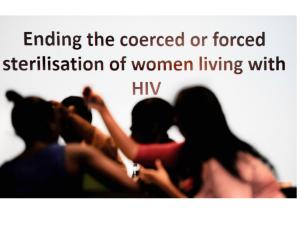
In March of this year, we wrote: “In South Africa this week, 48 women living with HIV and AIDS responded to the indignity and abuse of forced sterilization. Represented by Her Rights Initiative, Oxfam, and the Women’s Legal Centre, 48 women who had suffered forced sterilization in Gauteng and KwaZulu-Natal came forward and lodged a formal complaint. These 48 `cases’ were from 1986 to 2014. These 48 women are the tip of a rumbling volcano.” Yesterday, the volcano rumbled, as a report indicated that, of 6719 HIV positive women interviewed, 498 said they had been forcibly sterilized. “It is the largest number of reported forced sterilisation cases ever uncovered in the country.”
The report, The People Living With HIV Stigma Index: South Africa 2014, noted, under Sexual Reproductive Health: “Of concern is that 7% of respondents reported that they were forced to be sterilized. In addition, 37% of the respondents said that access to ARV treatment was conditional on use of contraceptives.” Sindisiwe Blose, a research project manager and a member of the Treatment Action Campaign, elaborated, “We heard from people living with HIV who had refused marriage due to stigma, had avoided work promotion, or had been coerced into undergoing sterilization. Behind the figures lies a depth of suffering that struggles to be addressed.”
Close to 500 women forcibly sterilized doesn’t just happen. In this instance, the incidents were distributed all over, with the hotspots in three provinces: Eden, in the Western Cape, accounted for 22%; Buffalo City, in the Eastern Cape, 20%; and Sedibeng, in Gauteng, 19%.
Sethembiso Mthembu, of Her Rights Initiative, responded to the numbers: “The data of 498 cases basically confirms the practice is widespread. It is systematic. It is not a few rotten apples.” The Women’s Legal Centre also described the sterilization as systemic, with Jody-Lee Fredericks, of the Centre, adding, “This is horrific.”
The horrific this is the banality of the policy. As Helen Rees of the Wits Reproductive Health & HIV Institute recently explained, the biggest concern right now is young women, ages 15 to 24, and women sex workers. Many of the young women who are “placed in this situation” are poor, vulnerable and “prey to sexual exploitation.” In other words, none of this is surprising.
Yesterday, Nkhensani Mavasa, the Chairperson of the Treatment Action Campaign, addressed the opening session of the South Africa Aids Conference 2015. She spoke of a new denialism among the leadership of the nation, and she warned, “If you choose to ignore the crisis in the healthcare system, this crisis that is a fact of our daily lives, you may, like those other denialists in the past, end up on the wrong side of history.”
The forced sterilization of HIV positive women is an integral part of that new denialism. In the complaint filed in March, 48 women and their supporters rejected the double stigma of being HIV positive and being unable to have children. They also rejected the third stigma of having failed the nation-State. Women who are HIV positive are viewed as failed citizens. That’s why they can be treated this way, despite Constitutional and legal protections to the contrary. The Department of Health says forced sterilization is not department policy, but it is practiced, in the open, regularly. The forced sterilization of HIV positive women is an integral part of State violence against women, and it is never accidental or incidental. It is part of the plan.
(Photo Credit: The Star / Chris Collingridge)